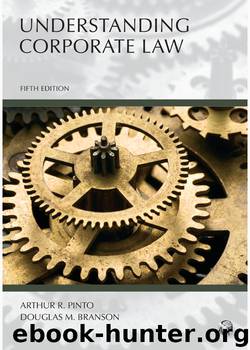Understanding Corporate Law by Arthur Pinto

Author:Arthur Pinto
Language: eng
Format: epub
ISBN: 9781531010010
Publisher: Carolina Academic Press
Chapter 10
Controlling Shareholders
§ 10.01 Introduction
If a shareholder or group acting together owns a majority of the voting shares of a corporation, it usually means de jure control for most shareholder decisions, including the selection of the directors.1 The control group may either be a number of shareholders acting together (such as a family or investment group) or it may be another corporation owning control creating a parent and subsidiary situation. In some situations, ownership of significantly less than a majority of shares may be the largest shareholding.2 In a publicly traded corporation with widely dispersed shareholders, owning less than a majority may provide a shareholder or group of shareholders acting together with de facto or so-called working control because no other shareholders have a competing significant ownership interest. The percentage needed to have this control will depend on a number of factors, including how widely dispersed the other shareholders are. Thus, one who owns less than a majority can be a controlling shareholder based upon their exercise of actual control over the business.3 In some cases, corporations may have different classes of stock, at least one of which has more voting rights and is held by founders or others (some of the larger tech companies such Google and Facebook have such voting structures).
There are advantages and disadvantages for shareholders in a corporation with a control group. Because of their large investment, the control group is less diversified than other shareholders and the fortunes of the business have a greater impact on them. Thus, the control group will closely monitor potential mismanagement to assure that the managers are running the business effectively. The corporation may be more efficiently run, and monitoring costs may be reduced because of the lack of separation of ownership from control. The business can take a long term view, since concerns about the stock markets are less important.4 A significant disadvantage occurs when there is an unfair conflict of interest transaction (i.e., self-dealing) between the control group and the corporation where the other shareholders are excluded or bad management harms the public shareholder. Many of the monitoring devices available when there is separation of ownership from control are not available. When there is a control group the possibility of either a proxy fight5 or a hostile takeover6 to take over control is diminished.7 Truly independent directors are less likely to serve on the board.8 Instead the minority shareholders must rely more on disclosure and fiduciary duty rules to protect them from self-dealing.9
Generally, a shareholder has no fiduciary duty when voting her shares because pursuing one's economic self-interest is the usual reason why one invests in shares. But controlling shareholders are not like other shareholders because they may use their control and position in the corporation unfairly for their own self-interest, harming minority shareholders.10 The fiduciary duty of controlling shareholders may come up in a variety of contexts as will be discussed in this chapter. Those shareholders may be involved in a self-dealing transaction with the corporation where
Download
This site does not store any files on its server. We only index and link to content provided by other sites. Please contact the content providers to delete copyright contents if any and email us, we'll remove relevant links or contents immediately.
The Social Psychology of Inequality by Unknown(3013)
The Plant Paradox by Dr. Steven R. Gundry M.D(2599)
The Writing on the Wall by Anselm Jappe(2038)
Working for Yourself by J.D. (Nolo) Stephen Fishman(1860)
Every Landlord's Legal Guide by Janet Portman & Stewart Marcia & Ralph Warner(1663)
Get What's Yours for Medicare by Philip Moeller(1656)
The First 20 Hours: How to Learn Anything ... Fast by Kaufman Josh(1655)
ADHD on Trial by Michael Gordon(1568)
Decisive by Chip Heath(1559)
Working for Yourself by Stephen Fishman J.D. (Nolo)(1521)
Drafting Contracts: How and Why Lawyers Do What They Do, Second Edition by Stark Tina L(1483)
The Lord of the Rings: The Fellowship of the Ring, the Two Towers, the Return of the King by J. R. R. Tolkien(1427)
A Practical Guide to International Arbitration in London by Hilary Heilbron(1424)
Restitution by Restitution(1424)
Intellectual Property Strategy by John Palfrey(1417)
The Economist Aug 8th 2015 by The Economist(1411)
The Economist Aug 29th 2015 by The Economist(1376)
Collusion by Luke Harding(1311)
Persuasion by Owner(1291)
